
PJSC Kryukiv Railway Car Building Works (KVBZ, Poltava region) ended January-September 2025 with a consolidated loss of UAH 76.1 million, while for the same period in 2024, net profit amounted to UAH 48.4 million.
According to the company’s interim consolidated financial statements published on its website, consolidated net income increased slightly to UAH 2.293 billion.
The uncovered loss amounted to UAH 138.8 million, compared to UAH 62.7 million a year earlier.
During the reporting period, the plant received UAH 106.6 million in consolidated losses from operating activities, twice as much as a year earlier, while gross profit decreased by 5% to UAH 119.8 million.
The KVBZ Group includes PJSC Kryukiv Railway Car Building Works, as well as wholly-owned subsidiaries LLC Instrumental Plant (production of equipment, spare parts, tools) and LLC V.N.V. (rental services, sale of railway cars).
According to the report, in January-September, revenue from the sale of railway cars increased by 4.2% to UAH 2.101 billion, with freight cars decreasing by 56.7% to UAH 873.2 million and passenger cars amounting to UAH 1.228 billion (there were no sales last year).
The cars were delivered to Ukrainian customers, in particular, 45 compartment passenger sleeping cars were shipped under a contract with Ukrzaliznytsia, four of which are equipped for the transportation of passengers with disabilities.
The group also reduced its revenue from the sale of spare parts by 46% to UAH 89.3 million, while revenue from the provision of services amounted to UAH 102.3 million (down 18%).
In Ukraine, products worth UAH 2.07 billion were sold (almost equal to last year’s figure), products worth UAH 207.9 million were delivered to European countries (almost three times more), and products worth UAH 10.5 million were delivered to Asia and the Middle East (12.5 times less).
According to KVBZ’s unconsolidated financial statements, the plant incurred a loss of UAH 76.7 million in January-September, compared to a net profit of UAH 40.7 million in the same period last year. Net income decreased slightly to UAH 2 billion 271 million.
KVZ notes that, given the significant surplus of freight cars on the Ukrainian market, low rental rates, and insufficient cargo base for the existing fleet of cars, only 5 freight cars were sold in the third quarter (121 in the first quarter and none in the second).
According to the company, in July-August 2025 (no information available for September), domestic competitors sold 316 freight cars under previously concluded contracts, and KVBZ’s share among private car manufacturers in Ukraine during this period was 12.7% (125 cars).
KVBZ manufactures passenger and freight cars, regional diesel trains, high-speed interregional locomotive-hauled trains, spare parts and bogies for freight cars, and escalators.
The average number of employees at the plant is 3,337 (last year – 3,611).
In 2024, the plant sold 1,096 freight cars, which is almost 10% more than sales in pre-war 2021. The first 15 passenger cars were also delivered to Ukrzaliznytsia under contracts for 66 units. Net profit amounted to UAH 81.08 million, compared to a loss of UAH 143.76 million in 2023.
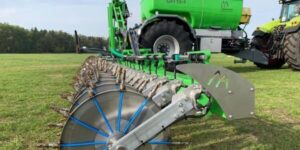
In January-September 2025, the KSG Agro agricultural holding received $5.96 million in operating profit and $6.92 million in gross profit, which is 68% and 31% more than in the same period last year, according to the agricultural holding’s press service.
“The significant increase in operating and gross profit was the result of the right management model, production modernization, pig herd renewal, and, as a result, resilience to the challenges of wartime. Against the backdrop of the war, the role of agribusiness has grown significantly, so farmers, including us, have learned not only to adapt to conditions of uncertainty, but also to increase production, invest in development, and provide Ukrainians with food,” commented Serhiy Kasyanov, chairman of the board of directors of KSG Agro.
As reported, in the first half of 2025, the agricultural holding doubled its revenue from the sale of pig products, paid UAH 88.2 million in taxes and fees to the budget, and entered the TOP 100 largest taxpayers in Ukraine.
The vertically integrated holding company KSG Agro is engaged in pig farming, as well as the production, storage, processing, and sale of grain and oilseeds. Its land bank in the Dnipropetrovsk and Kherson regions is about 21,000 hectares.
According to KSG Agro, it is one of the top five pork producers in Ukraine. In 2023, the agricultural holding began implementing a “network-centric” strategy, under which it will transition from developing a large location to a number of smaller pig farms located in different regions of Ukraine.
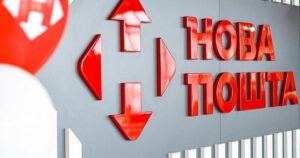
Nova Poshta, the leader in express delivery in Ukraine and part of the Nova Group, increased its consolidated net profit by 35.1% in January-September 2025 compared to the same period last year, to UAH 2 billion 876.38 million.
According to the company’s consolidated interim report on its website, consolidated net revenue increased by 21.7% to UAH 45 billion 727.67 million.
It is noted that Nova Poshta’s gross profit for the first nine months of 2025 reached UAH 10.81063 billion, which is 18% more than in the same period last year, while operating profit increased by 19.8% to UAH 5.67507 billion.
In January-September this year, the company spent UAH 2.9428 billion on the acquisition of non-current assets, which is 39.7% less than in January-September last year.
According to the report, loans received in the first nine months of this year decreased by 16.6% to UAH 4.05 billion, while their repayment increased by 68.8% to UAH 4.98 billion, interest expenses by 24.8% to UAH 1.14 billion, and finance lease liabilities by 27.2% to UAH 1.88 billion.
In addition, dividend payments increased by 68.2% to UAH 1.04 billion.
According to the report, the balance of funds at the end of the third quarter was UAH 8.79 billion, compared to UAH 9.09 billion at the beginning of the year and UAH 5.27 billion a year ago.
As reported, according to the published interim unconsolidated financial statements, Nova Poshta increased its revenue for the first nine months of this year by 22.5% compared to the same period in 2024 to UAH 37.73011 billion and reduced its net profit by 6.2% to UAH 1.54420 billion.
In the first half of 2025, Nova Poshta increased its consolidated net profit by 18.6% compared to the same period last year, to UAH 1.765 billion, and its consolidated net income by 22%, to UAH 29.829 billion.
The Nova Poshta website states that the company has 110 terminals and depots throughout the country, with the eight largest terminals located in Kyiv, Kharkiv, Khmelnytskyi, Lviv, Dnipro, Odesa, and Zaporizhzhia.
As of October 6, the leader in express delivery in Ukraine had 44,983 service points, including 14,336 branches and 30,647 post offices. In the first half of this year, the branch network grew by 708 points to 13,985, and the number of parcel terminals increased by more than 4,000 to 28,326.
The ultimate beneficial owners of the company are Volodymyr Poperechnyuk and Vyacheslav Klimov.
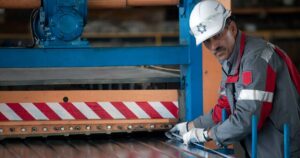
In January-September this year, Metinvest-Resource LLC increased its net profit to UAH 44.721 million from UAH 3.475 million in the same period last year.
According to the company’s interim report, which is available to Interfax-Ukraine, its profit in the third quarter of 2025 amounted to UAH 21.647 million.
Revenue for this period increased by 27.8% to UAH 3 billion 919.585 million.
The uncovered loss at the end of September amounted to UAH 57.4 million.
In 2024, the LLC received a net profit of UAH 6.085 million, while it ended 2023 with a loss of UAH 43.270 million, and in 2022, the net loss was UAH 129.227 million.
Metinvest-Resource LLC is the exclusive supplier of ferrous metal scrap to the Ukrainian metallurgical enterprises of the Metinvest Group. Metinvest-Resource LLC’s capabilities enable it to continuously supply more than 1.5 million tons of raw materials per year to meet the needs of the group’s metallurgical assets. The company has a history spanning more than 20 years, dating back to the founding of PFK Prometey LLC, which was renamed Metinvest-Resource LLC in February 2011.
The company has many years of experience in the domestic and foreign scrap metal markets in terms of purchasing scrap metal and its substitutes (GBZ), and delivers them by all modes of transport. Metinvest-Resource LLC actively participates in joint projects to dismantle various metal facilities in the country. It has established business relationships with more than 100 scrap metal procurement companies in Ukraine and around the world.
The company’s authorized capital is UAH 6.437 million.
Metinvest is a vertically integrated group of mining and metallurgical enterprises. Its enterprises are located in Ukraine – in the Donetsk, Luhansk, Zaporizhzhia, and Dnipropetrovsk regions – as well as in European countries. The main shareholders of the holding company are SCM Group (71.24%) and Smart Holding (23.76%). Metinvest Holding LLC is the management company of the Metinvest Group.
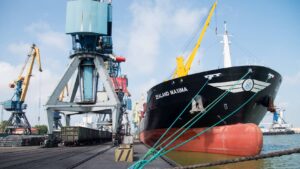
Metinvest Shipping, the logistics division of Metinvest Group, earned a net profit of UAH 114.146 million in January-September this year, compared with a net loss of UAH 16.227 million in the same period last year.
According to the company’s interim report, which is available to Interfax-Ukraine, its profit in the third quarter of 2025 amounted to UAH 81.299 million. Revenue for this period decreased by 13% to UAH 1 billion 752.366 million. Undistributed profit at the end of September amounted to UAH 1 billion 367.237 million.
The company ended 2024 with a loss of UAH 67.393 million, compared to UAH 729.472 million in 2023.
Metinvest Shipping LLC has been part of the Metinvest Group since 2006. The company has branches in Mariupol (operations temporarily suspended) and Odesa. The company’s activities cover the entire range of freight transport services: organization of road and rail transport, customs clearance, forwarding, ship agency, and chartering of the maritime fleet.
Since 2019, the company has been inspecting metal products of Metinvest Group enterprises. Between 2010 and 2024, Metinvest Shipping handled over 364 million tons of cargo, provided agency services for over 9,000 vessels, and transported approximately 896 million tons of cargo by rail. The company owns more than 2,300 units of rolling stock, including 11 diesel locomotives.
As of December 31, 2024, the average number of employees in the company was 220.
Metinvest Holding LLC owns a 100% stake in Metinvest Shipping LLC ”
The LLC’s authorized capital is UAH 25.012 million.
Metinvest is a vertically integrated group of mining and metallurgical enterprises. Its enterprises are located in Ukraine, in the Donetsk, Luhansk, Zaporizhia, and Dnipropetrovsk regions, as well as in European countries.
The main shareholders of the holding company are SCM Group (71.24%) and Smart Holding (23.76%). Metinvest Holding LLC is the managing company of the Metinvest Group.
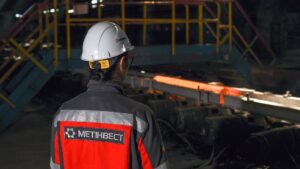
Metinvest Group’s network of service metal centers in Ukraine, Metinvest-SMZ LLC, increased its net profit by 43.1% in January-September this year compared to the same period last year, to UAH 613.539 million.
According to the company’s interim report, which is available to the Interfax-Ukraine agency, its profit in the third quarter of 2025 amounted to UAH 244.074 million.
Revenue for this period increased by 13% to UAH 31 billion 735.554 million.
Retained earnings at the end of September amounted to UAH 3 billion 975.420 million.
In 2024, the LLC received a net profit of UAH 480.537 million, while in 2023 it amounted to UAH 881.551 million.
In 2025, the LLC plans to invest UAH 6.86 million (excluding VAT) in modernization.
As of December 31, 2024, the company had 546 employees.
Metinvest-SMZ LLC is the largest network of service metal centers in Ukraine, operating on the market since 2003. The LLC’s metal centers are located in key industrial cities of the country, such as Kyiv, Kharkiv, Dnipro,
Zaporizhzhia, Lviv, Odesa, and many others.
The LLC’s authorized capital is UAH 17.205 million.
Metinvest is a vertically integrated group of mining and metallurgical enterprises. Its enterprises are located in Ukraine – in the Donetsk, Luhansk, Zaporizhia, and Dnipropetrovsk regions – as well as in European countries. The main shareholders of the holding company are SCM Group (71.24%) and Smart Holding (23.76%). Metinvest Holding LLC is the managing company of the Metinvest Group.